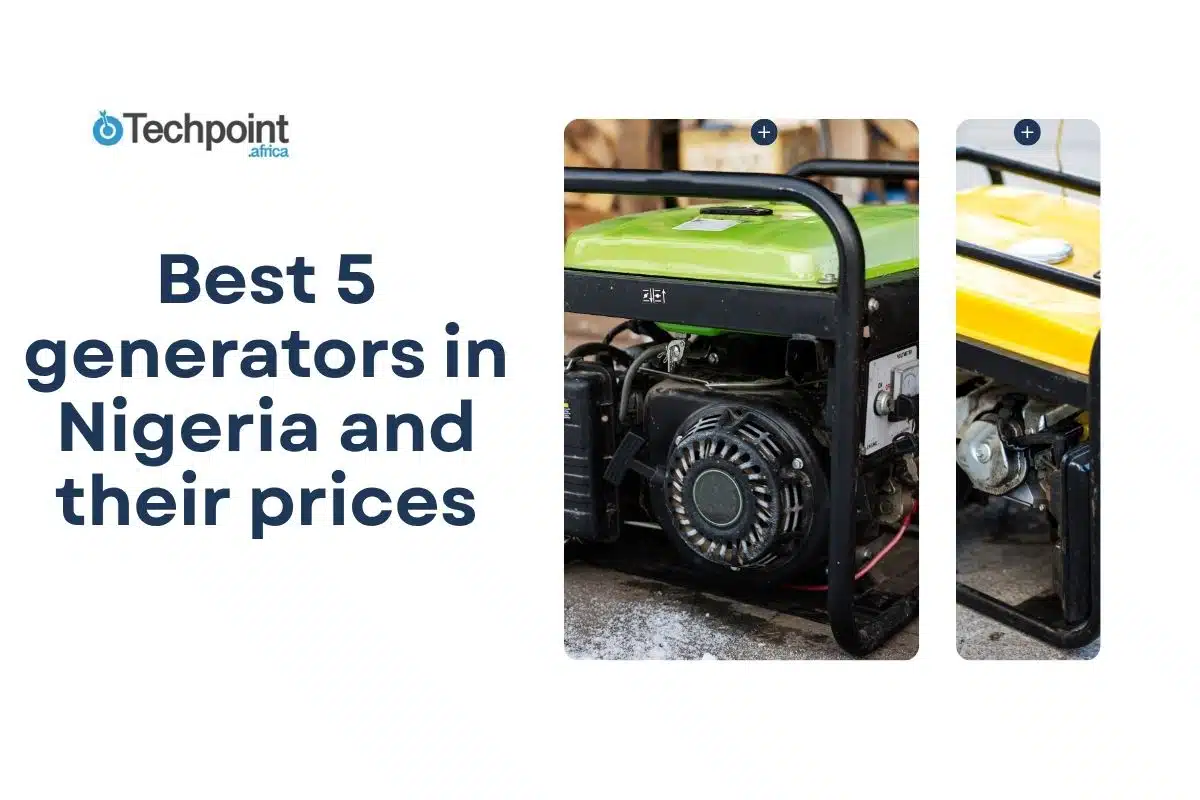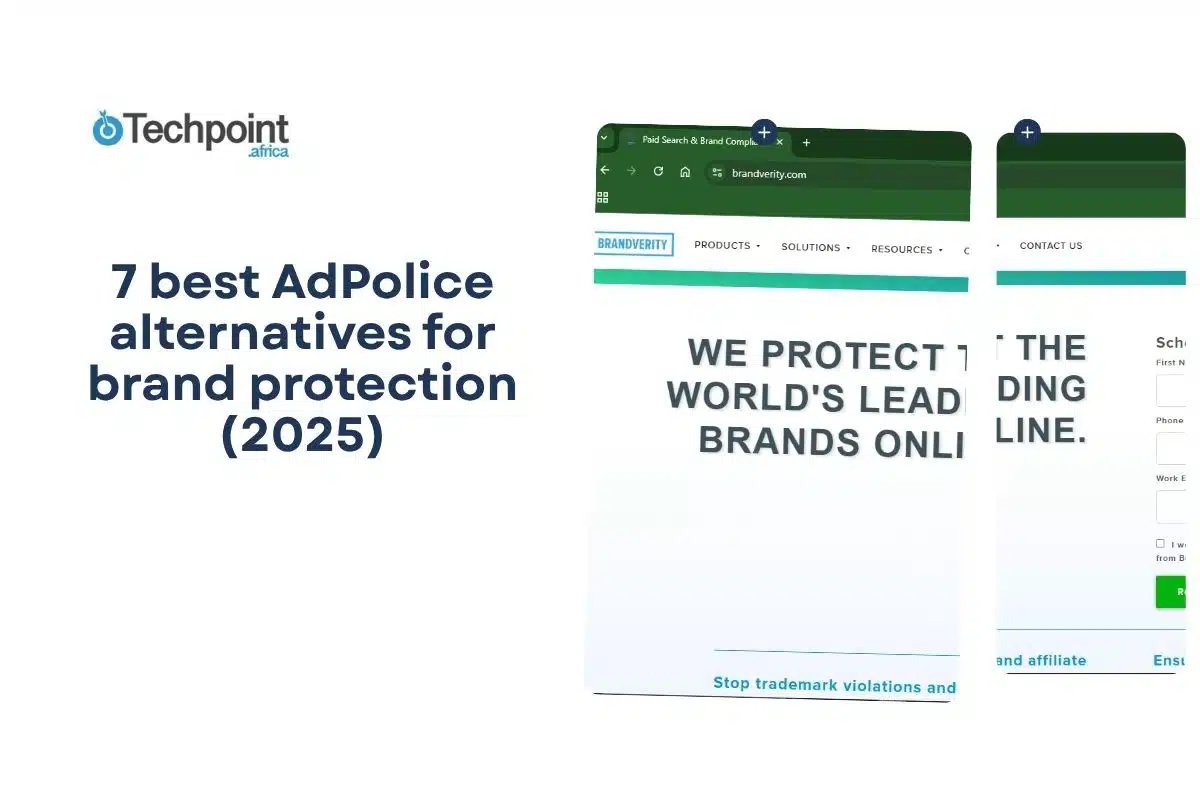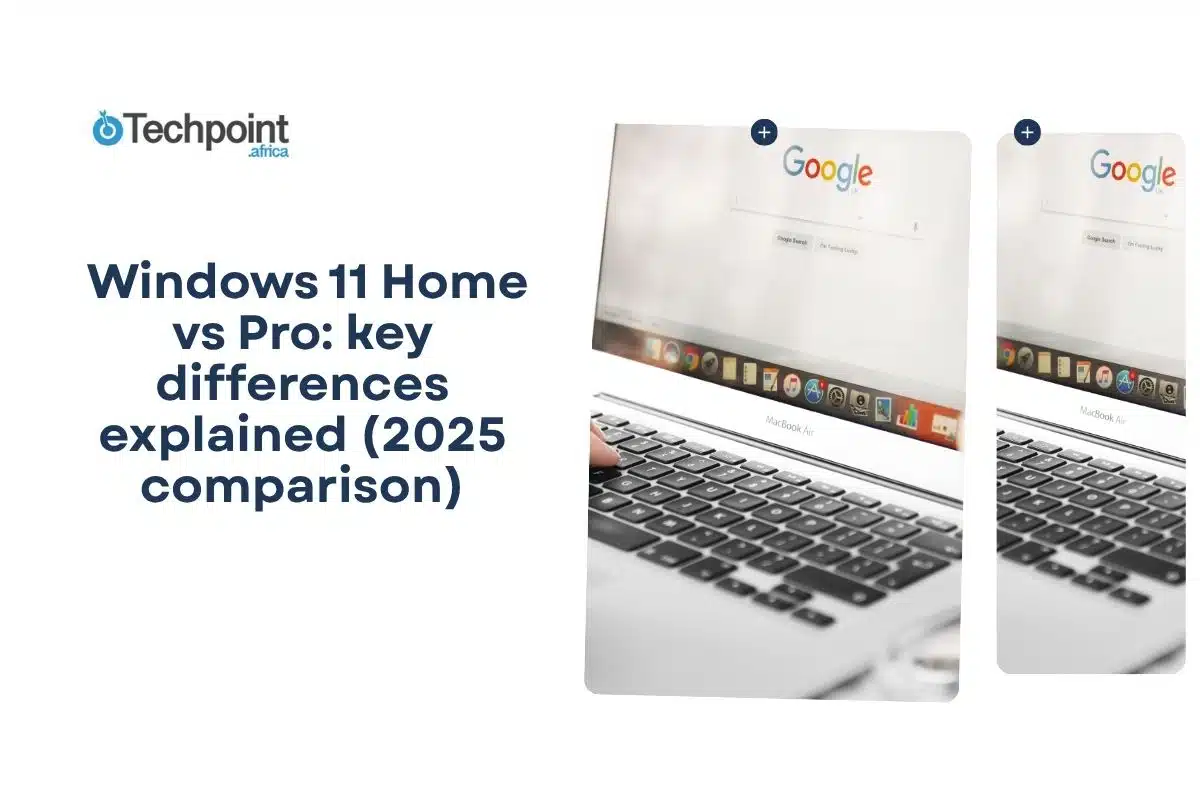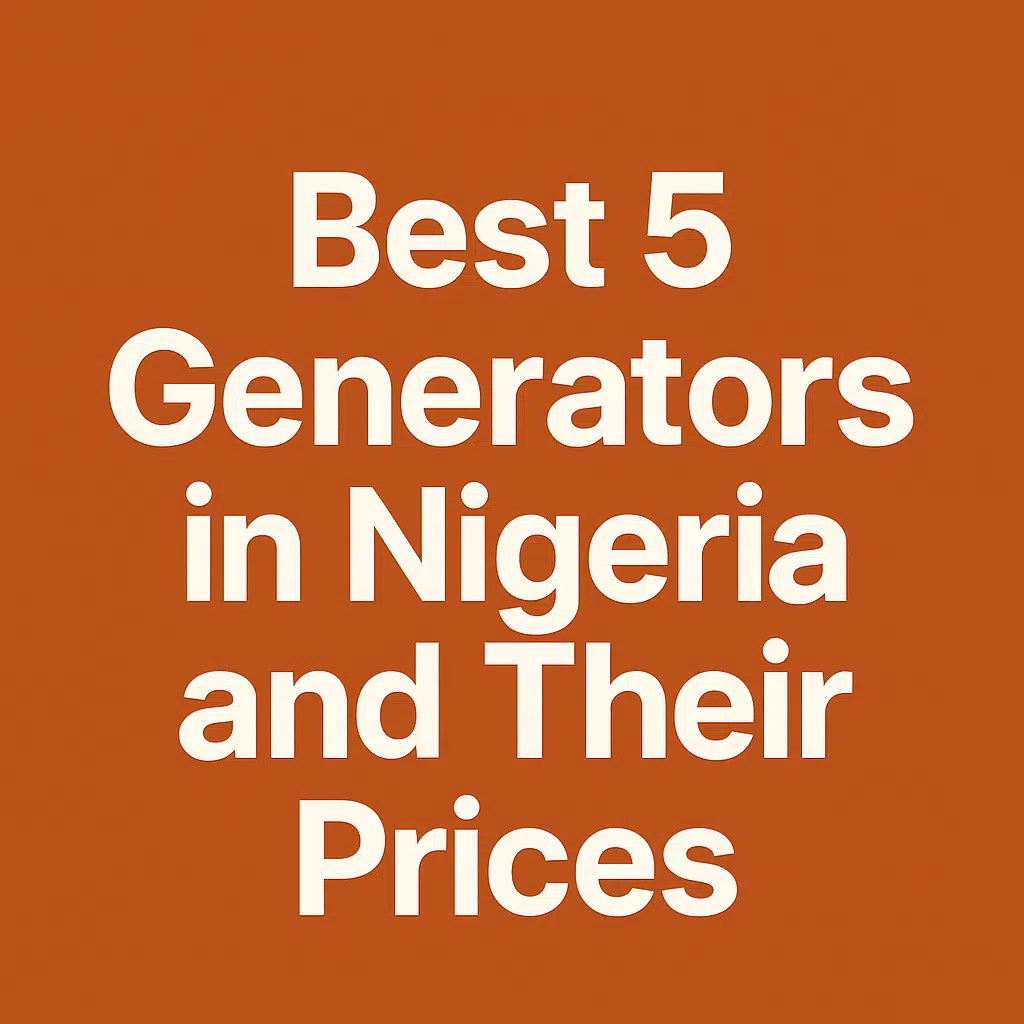
Power supply in Nigeria is unpredictable. Some days, you have light for hours. Other times, it’s out with no return in sight. That’s why having a backup source is important.
Solar is a clean option, but powerful systems cost a lot to install. For many people, generators are still the most practical choice. They’re easier to afford, simple to run, and come in different sizes for different needs.
In this guide, you’ll find five of the best generators in Nigeria right now. You’ll see what each one is best for, how much it costs, and what kind of space it can handle — whether it’s a small home or a business.
Let’s get into it.
What are the types of generators available?
Before you decide on which generator to buy, it’s good to understand the different types available. Each one serves a different purpose, depending on how much power you need, what you want to run, and how often you plan to use it.
- Portable Generators
These are the most popular in homes across Nigeria. They’re usually petrol-powered and come in smaller sizes, making them easy to move around. If you just want to power your lights, fans, TV, and maybe a fridge, a portable gen is often enough.
- Inverter Generators
These are designed for fuel efficiency and quiet operation. They produce stable electricity, which makes them ideal for sensitive electronics like laptops or home office equipment. They’re more expensive than regular generators but save fuel in the long run.
- Diesel Generators
Built for heavier use, diesel generators are strong, durable, and often used in larger homes or businesses. Diesel fuel lasts longer than petrol and burns more slowly, which makes it a cost-effective option over time.
- Standby Generators
These are larger, fixed units that kick in automatically when power goes out. They’re great for people who can’t afford downtime, like small businesses, clinics, or households with high power needs. They cost more upfront but offer convenience and reliability.
- Gas (LPG) Generators
Some modern models run on cooking gas. They’re cleaner, quieter, and cheaper to fuel, but not as widely supported as petrol or diesel types. Still, they’re worth considering if you want a more eco-friendly option.
How we chose the best 5 generators in Nigeria right nnowow
With so many options out there, it’s easy to feel overwhelmed when trying to choose a generator. That’s why we took time to carefully select five that offer real value, based on what matters most to buyers in Nigeria.
Here’s what guided our picks:
- Real Buyer Feedback
We looked through reviews on trusted Nigerian platforms like Jumia, Konga, SmartMall, Tobuy.ng, and Jiji. We also checked forums like Reddit and Nairaland to see what everyday users say about performance, fuel use, and durability.
- Power Range Variety
Everyone has different needs. Some want a gen to power lights and fans. Others want to run an entire household or business. So we included small, medium, and heavy-duty options — from 2.5 kVA to 10 kVA.
- Availability in Nigerian Markets
No point recommending a generator you can’t find here. All five options are available across major online stores and local markets in Nigeria.
- Easy Access to Spare Parts
Generators break down sometimes, and parts should be easy to find. Every gen on this list is from a brand that’s popular enough to have spare parts and service technicians close by.
- Value for Money
We didn’t just go for the cheapest or the most expensive. Each one offers strong performance for its price — whether it’s fuel economy, quiet operation, or durability.
Next , let’s explore five of the best generators in Nigeria right now, along with what they’re best used for and how much they cost.
5 best generators in Nigeria and their prices 2025
Now that you have an idea of the types of generators available, it’s time to look at some of the best options on the market right now. We’ve selected a mix of small, mid-size, and heavy-duty generators to help you find one that matches your specific needs.
Here’s a quick look at our top 5 picks and what each one is best suited for:
- Senci SC4000 (2.5 kVA) – Best for small homes or basic backup use
- Maxi E50K (5 kVA) – Best for mid-size households and everyday use
- Lutian LT8990E (6.9 kVA) – Best for larger homes with multiple appliances
- Honda EZ3000CX (2.8 kVA) – Best for quiet, fuel-efficient performance
- Elepaq SV22000E2 (10 kVA) – Best for full-home backup or business use
We’ll now take a closer look at each of these generators, covering what they offer, how much they cost in 2025, and why they might be the right fit for you.
1. Senci SC4000 (2.5 kVA / 3.3 kW)
Best for small homes or basic backup use
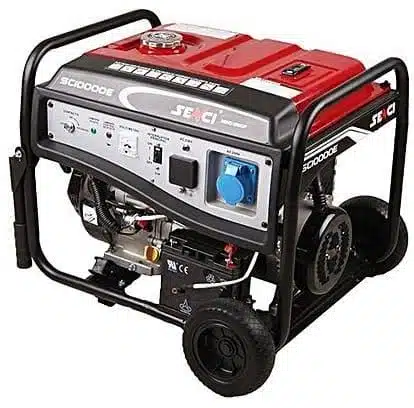
The Senci SC4000 is a durable, petrol-powered generator built for everyday use. It offers reliable power with a steady 3.3 kW (rated) and peaks at 3.8 kW when you need a bit more. With a solid frame, wheels, and a handled design, it’s portable without sacrificing strength.
Price Range
The Senci SC4000‑II is currently priced between ₦320,000 and ₦500,000 in Nigeria, depending on the seller and specific features like electric start or bundled accessories.
Key Features
- Engine & Alternator: SC170FB 223cc 7.5HP petrol engine paired with a quality Senci alternator
- Start Options: Electric start via onboard 12V battery, plus manual recoil backup
- Safety & Stability: AVR ensures consistent voltage; low-oil shutdown protects the engine; overload circuit breaker adds safety
- Runtime & Fuel Tank: 15 L tank provides around 13 h at half load
- Noise Level: 65 dB at 7 m—noticeable but manageable with proper placement
- Additional Perks: Includes wheel kit, dust-proof panel, waterproof frame, spark-arrest muffler, and dual 230 V/115 V sockets
Who Should Choose This?
- First-time generator buyers who need something dependable and easy to use
- Budget-conscious users wanting a balance of power, features, and portability
- Homeowners in moderate load situations—say, 2–3 fans, several lights, a fridge, and a small TV
If your goal is consistent backup for a small home or apartment, running lights, fans, a fridge, and a TV, the SC4000-II is a solid pick. You get easy starting, good fuel economy, and built-in protections. It’s portable and robust enough for outdoor or home use.
2. Maxi E50K (≈5 kVA / 6.2 kVA peak)
Best for mid-size households and everyday use
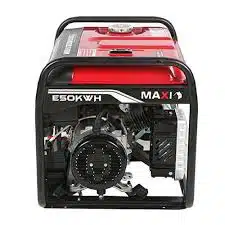
If you need more power for your home or just something a bit beefier than a small portable gen—the Maxi E50K fits the bill. It delivers a reliable 5 kW rated output, hits 6.2 kVA at peak, and includes a key start plus remote control for convenience. This makes it a solid option for mid-size households or working spaces.
Key Features
- Power Output: 5 kW rated, 6.2 kVA peak—enough for heavy appliances
- Fuel Tank & Runtime: 15 L petrol tank; with a copper coil alternator, it runs smoothly
- Start Options: Comes with key, electric start, manual recoil, and remote control
- Protection: Automatic Voltage Regulator (AVR), oil alert, and brake sensor for engine safety
- Mobility: Fitted with wheels and handles—easy to move around.
Price range
You’ll find the Maxi E50K priced between ₦690,000 and ₦795,000, depending on the variant and seller. Models with remote control features or bundled accessories tend to cost more, while the standard key-start versions are on the lower end of the range.
Ideal For
If you run more than just lights and a fridge, this gen can support your needs. You’ll be able to run a small AC, multiple fans, and several lights without worry. The remote start is a real convenience, it saves you the hassle of manual starts. Safety features like AVR and oil-alert mean the machine looks after itself while you get on with life.
3. Lutian LT8990E (≈6.9 kVA / up to 8 kVA Peak)
Best for larger homes with multiple appliances
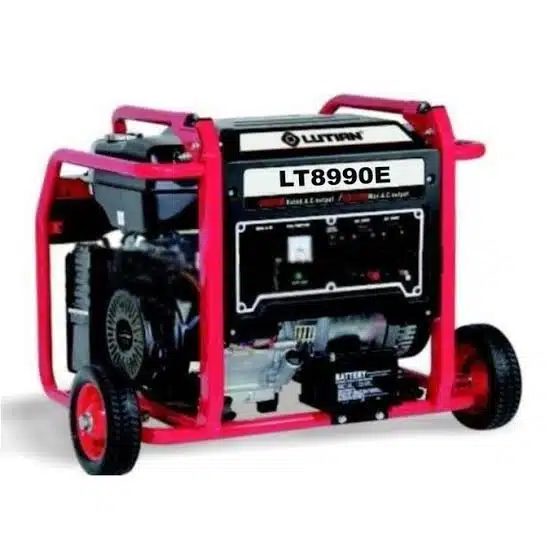
The Lutian LT8990E is a versatile mid-to-large size petrol generator that’s making waves in Nigerian households and small businesses. It delivers around 6.9 kVA of steady power, with peak capabilities close to 8 kVA. Buyers appreciate its remote start feature and sturdy build.
Key Features
- Power Output: Delivers 6 kW continuous and up to 8 kVA peak—enough to run air conditioners, several fans, lights, and a fridge.
- Start Mechanism: Offers key start, electric start, recoil backup, and a remote control option for easy use.
- Copper Coil Alternator: Ensures better voltage stability and lower heat compared to cheaper aluminum coils.
- Fuel & Runtime: Built-in tank holds 25–33 L, giving you 10–13 hours of power at half load
- Safety & Convenience: Equipped with low-oil shutoff, AVR, wheels, and handles for mobility.
- Optional LPG Kit: Some units include a gas conversion kit—a cleaner and more economical fuel option
Price Range
In June 2025, the LT8990E is priced between ₦720,000 and ₦1,235,000 in Nigeria. Smaller sellers list it around ₦560K–₦800K. Mid-tier online shops offer it for ₦736K–₦987K while top-end stores push it to ₦1.2M.
Ideal For
If you’re powering a larger home or small business, this gen has enough juice for lights, fans, a freezer, washing machine, and even a small AC. The remote start makes it easy to turn on from the comfort of your room. Plus, the optional gas kit gives you flexibility and potential fuel savings.
4. Honda EZ3000CX (≈2.3 kW Rated / 2.5 kVA Peak)
Best for quiet, fuel-efficient performance
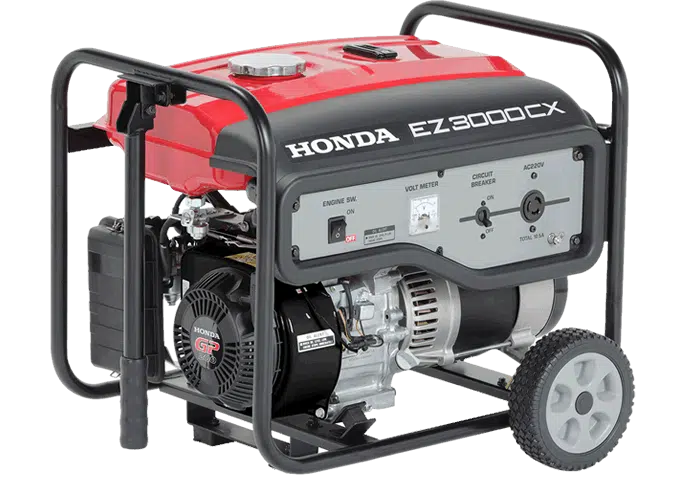
The Honda EZ3000CX is a reliable, portable petrol generator built with Honda’s well-known GP200 engine. It’s designed for steady performance, low noise, and efficient fuel consumption. This model is popular because it survives frequent use and treats electronics kindly with AVR voltage control.
Key Features
- Power Output: Rated at 2.2 kVA and peaks at 2.5 kVA, ideal for light household use.
- Engine & Fuel Tank: Honda GP200, 196 cc engine with a 11–13 L tank. You get around 7–9 hours run time on a single fill.
- Start-Up: Standard recoil (manual) start. No electric or remote option—less complexity and lower cost.
- Safety & Control: Features AVR for clean power and oil alert to protect the engine
- Build Quality: Steel frame wraps the engine for protection and ease of handling. Weighs around 42–46 kg .
Price Range
As of mid-2025, expect to pay between ₦510,000 and ₦640,000, depending on the seller and exact specifications:
- ₦510K at Kara
- Around ₦515K–₦602K at Blue Breeze Store
- ₦580K at Blessed David (official)—with warranty and free delivery in Lagos and PH
Ideal For
This model is perfect if you need clean, stable power with minimal hassle:
- Great for powering sensitive electronics including laptops, routers, TVs, because of its AVR system.
- Suitable for small apartments or backup rooms, supporting lights, fans, a fridge, and charging devices.
- Easy to maintain with Honda’s reputation and readily available parts.
If you want quiet, consistent, and dependable power without needing massive output or fancy start systems, the EZ3000CX is a strong choice.
5. Elepaq SV22000E2 (≈10–12 kVA Rated / 12 kVA Peak)
Best for full-home backup or business use
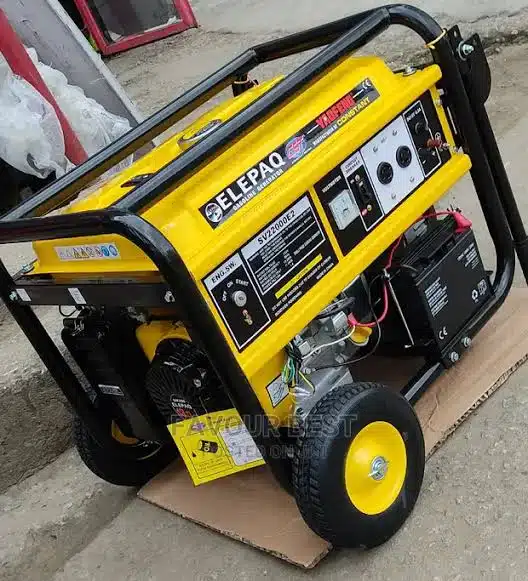
The Elepaq SV22000E2 is a powerhouse petrol generator from a brand well-known in Nigeria. It delivers a solid 10–12 kVA peak, making it a top choice for full-home backup or small businesses. The all-copper alternator and 25 L fuel tank show it’s built for serious performance.
Key Features
- Power Output: Runs at 10.5–11.5 kVA and peaks at 12 kVA .
- Engine & Tank: Equipped with GX390 13 HP engine and 25 L tank, offering about 13 hours of run time at half load
- Start Options: Includes electric and recoil/manual start systems
- Construction & Mobility: Features a 100% copper brushless alternator, sturdy frame, wheels, and handles. Noise level is around 82 dB at 7 m distance
- Voltage Regulation: AVR control ensures stable output.
Price Range
As of mid-2025, the SV22000E2 usually costs between ₦650,000 and ₦800,000 in Nigeria. Prices vary based on seller, exact model (10 kVA vs 12 kVA), and added features.
Ideal For
This generator is ideal when you need reliable full-home backup. It can handle AC units (1–2 HP), multiple freezers, pumping machines, lighting, and office equipment without strain. If you’re running a small business, this unit ensures smooth operations during power outages. Its fuel capacity and construction make it dependable over long hours.
5 best generators in Nigeria at a glance
| Generator | Output | Start type | Fuel tank | Run time | Best For | Pricing |
| Senci SC4000-II | 2.5 kVA / 3.3 kW | Manual | 15L | 10–12 hrs | Light use, students, small rooms | 320,000 – 500,000 |
| Maxi E50K | 5 kVA / 6.2 kVA Peak | Key + Recoil + Remote | 15L | 9–11 hrs | Mid-size homes, essential appliances | 690,000 – 795,000 |
| Lutian LT8990E | 6.9 kVA / 8 kVA Peak | Electric + Remote + Recoil | 25–33 L | 10–13 hrs | Larger homes, small businesses | 720,000 – 1,235,000 |
| Honda EZ3000CX | 2.3 kW / 2.5 kVA Peak | Manual | 11–13 L | 7–9 hrs | Sensitive electronics, compact spaces | 510,000 – 640,000 |
| Elepaq SV22000E2 | 10–12 kVA | Electric + Recoil | 25L | 12–13 hrs | Full-home backup, offices, shops | 650,000 – 800,000 |
How to choose the best generator for your needs
Picking the right generator isn’t just about price, it’s more about what you need it to power. Before you buy, take a moment to answer these key questions:
- What appliances do you want to power?
Write down a quick list. Is it just a few bulbs, fans, and maybe a TV? A 2.5 kVA generator like the Senci SC4000-II might be enough. But if you’re running a fridge, freezer, AC, and water pump, you’ll need something stronger like the Elepaq SV22000E2.
- How often will you use it?
If you’re using it daily or for long hours (especially during outages), go for a generator with a bigger fuel tank and copper coil for durability. The Lutian LT8990E or Maxi E50K are good options for longer use.
- Is fuel efficiency important to you?
Petrol generators are the most common in Nigeria, but they vary in how long they run per litre. Always check the runtime at 50% load. The Honda EZ3000CX is known for being fuel-efficient.
- Do you need an electric or remote start?
Electric and remote start generators save you from pulling a rope each time. If ease matters to you, don’t overlook this feature. The Maxi and Lutian models offer this.
- How much noise can you tolerate?
Generators can be loud. If you stay in a quiet neighborhood or have young kids, consider models that are quieter or have mufflers built in.
- What’s your budget?
Don’t just buy the cheapest one you see. Make sure it meets your power needs and comes with a warranty. Sometimes spending a little more upfront saves you stress down the line.
Quick tips to maintain your generator
To get the best out of your generator and avoid sudden breakdowns, proper maintenance is key. Follow these tips to keep yours running smoothly:
- Check the Oil Regularly
Always check your oil level before starting the generator. Low oil can damage the engine. Change the oil after the first 20 hours of use, then every 50–100 hours afterward, depending on usage.
- Clean or Replace the Air Filter
Dust is everywhere in Nigeria, and it clogs air filters fast. Clean the filter every few weeks, especially during dry season. Replace it if it looks worn or torn.
- Use the Right Fuel
Use clean petrol and never let old fuel sit in the tank for weeks. It can gum up the carburetor. If you won’t use the generator for a while, drain the tank.
- Don’t Overload It
Know your generator’s capacity and stay within it. Overloading strains the engine and can damage both the generator and your appliances.
- Run It Dry Before Storage
If you won’t use it for more than a week, let the fuel run out or drain the tank. This prevents clogs and makes restarting easier.
- Start It Regularly
Even if there’s steady power for a while, start your generator at least once every two weeks. This keeps the battery (for electric start types) and engine healthy.
- Store It in a Dry, Ventilated Space
Avoid rain or moisture. Cover your generator with a breathable waterproof cover when not in use, and keep it away from direct sun or dust.
Final thoughts
Power supply in Nigeria can be unpredictable, and it affects everything, from daily routines to running a business. Generators help bridge that gap, and choosing the right one makes all the difference.
We’ve walked through some of the best options available right now. Each one suits a different kind of user, from those looking to power just a few essentials to those who need something bigger for their home or workspace.
Before you buy, think about what you really need. How much power? How often will you use it? What’s your budget? Once you’ve got those answers, it’s easier to pick a generator that won’t stress you later.
Invest in something reliable. It’ll save you time, money, and frustration in the long run.

